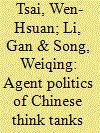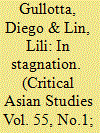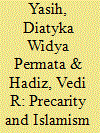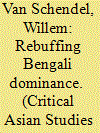|
|
|
Sort Order |
|
|
|
Items / Page
|
|
|
|
|
|
|
| Srl | Item |
| 1 |
ID:
190422


|
|
|
|
|
| Summary/Abstract |
This paper analyzes the relationship between the Chinese government and domestic think tanks. Chinese think tanks in the cultural sector have a strong demand-side orientation; that is, they closely follow the instructions of the Chinese Communist Party (CCP) in their stand on culture-related policies. Since 2018, the CCP has strengthened its control over the propaganda and cultural affairs, using think tanks to this end. Think tanks act as dual agents, maximizing the benefits offered by their two principals – the party government and private businesses, while prioritizing the former. The paper examines the development of the Putuo Island Park in Zhejiang Province and the Cultural Industry Research Institute, the key cultural industry think tank in this province. While upholding Xi Jinping’s aspiration of developing China into a “cultural great power,” cultural think tanks’ main function is to endorse government policies and guide businesses to support those policies when necessary. The CCP under Xi has intensified its manipulation of think tanks to reinforce its control over ideology and the socialist market economy, resulting in a more complex relationship between the state and think tanks.
|
|
|
|
|
|
|
|
|
|
|
|
|
|
|
|
| 2 |
ID:
190421


|
|
|
|
|
| Summary/Abstract |
This article examines the capacities of community-based labor nongovernment organizations (NGOs) in China to raise workers’ consciousness and build solidarity among workers in the post-2018 era. It closely studies the transformation of a community-based labor NGO in the Yangtze River Delta and investigates the relationships among managers, workers, community members, NGO staff members, and volunteers. Although state repression and funding concerns limit the space for workers and subalterns to represent themselves and act politically in China, the internal organizational structure of labor NGOs such as this has exacerbated their stagnation. This is due to a top-down decision-making process, a lack of democratic participation and transparency, selective inclusion, a neglect of collective possibilities, and techno-social features such as social media technology. The result is maintenance of the status quo. These organizational limitations prevent community-based labor NGOs from functioning as a progressive force and turns them into marginal social forces that strive to survive and are incapable of representing workers and adjusting to workers changing needs.
|
|
|
|
|
|
|
|
|
|
|
|
|
|
|
|
| 3 |
ID:
190424


|
|
|
|
|
| Summary/Abstract |
This paper examines the limits of Indonesian civil society activism in advancing democratic politics. This activism, mainly by middle-class reformers, has not only failed to prevent democracy from being hijacked by illiberal interests but also contributed to justifying the deepening of political illiberalism. A predominantly anti-political approach among civil society activists mainly aims to establish new institutions and policy designs to generate reforms, while allowing entrenched power relations to remain unchallenged and to pervade new institutions. Meanwhile, social protests mobilized by this kind of activism, both on the streets and social media platforms, also tend to be sporadic and have no clear leadership and structure, while protest demands are often contradictory, making these too weak to challenge anti-democratic interests. This paper challenges existing studies that extoll Indonesian civil society activists for their success in advocating certain legislation, policies, and institutions. The weakening of the Indonesian Corruption Eradication Commission (Komisi Pemberantasan Korupsi, KPK) illustrates how even trusted democratic institutions equipped with extraordinary powers and capacities are vulnerable to vested interests. Not only have Indonesian civil society activists failed to defend the KPK, but many of them have justified attempts to paralyze this agency.
|
|
|
|
|
|
|
|
|
|
|
|
|
|
|
|
| 4 |
ID:
190423


|
|
|
|
|
| Summary/Abstract |
This article investigates the Chinese party-state’s hegemonic project to construct social consent in NGOs and how they react to this. Using service-oriented NGOs as examples, it argues that the changing institutional dynamics of NGO governance in China demonstrates that Chinese civil society is a site of ideological struggle. The party-state has adapted some foreign concepts and practices of civil society, which have been popular in China since the reform era, to serve its political and socioeconomic agenda, while avoiding political challenges of liberal values and discourse. Civil society’s hegemonic transformation relies on two major mechanisms—professionalization and Maoist incorporation. This process, however, also leaves some space for NGOs to act differently. Some have been comfortably incorporated into the state-led welfare system and reproduce authoritarian norms and practices among their beneficiaries, whereas counter-hegemonic activism still exists among groups that link their stance and agenda closely with marginalized groups in society.
|
|
|
|
|
|
|
|
|
|
|
|
|
|
|
|
| 5 |
ID:
190425


|
|
|
|
|
| Summary/Abstract |
This article investigates the link between growing precarity – associated with the process of neoliberal economic globalization – and growing Islamist tendencies in Indonesian society, through a case study of app-enabled transport workers. It applies a Gramscian notion of common sense to understand workers’ responses to their experiences of socio-economic marginalization and the articulation of their grievances. The combination of the near hegemony of a neoliberal worldview that encourages individual entrepreneurial prowess and an Islamist focus on moral self-cultivation inadvertently contributes to workers’ normalization of their precarity, furthering the atomization of the workforce. It also helps provide the setting for mobilizations of the urban precariat under Islamic banners, without challenging the imposition of neoliberal ideology on work and life.
|
|
|
|
|
|
|
|
|
|
|
|
|
|
|
|
| 6 |
ID:
190426


|
|
|
|
|
| Summary/Abstract |
A vast literature analyzes how Bengali identities developed in colonial India. This article steps away from both celebratory approaches and a focus on the colonial period. Instead, it explores how non-Bengalis increasingly challenged Bengali superiority in more recent times. As the colonial incarnation of a genteel Bengaliness lost its bearings and split into competing territorial manifestations in East Pakistan (later Bangladesh) and India, it encountered rising hostility and developed both assertive and timid configurations. This article offers an exploratory overview of how various groups of non-Bengalis have been rebuffing Bengali dominance by means of cultural distancing, graphic resistance, the ideology of indigeneity, insurgency, and the legal and military force of postcolonial states.
|
|
|
|
|
|
|
|
|
|
|
|
|
|
|
|
|
|
|
|
|